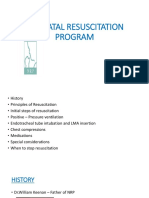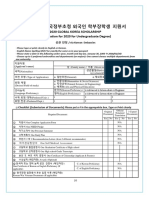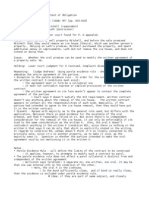83%(12)83% found this document useful (12 votes)
6K viewsNursing Informatics Periodical 2
Nursing Informatics Periodical 2
Uploaded by
JharaIntellectual property laws in the Philippines are administered by the Intellectual Property Office and protect copyrights, trademarks, patents, and other creations. The Copyright Law of the Philippines protects original literary and artistic works and provides economic rights such as controlling replication or distribution, and moral rights such as requiring attribution of authorship. Intellectual property law aims to incentivize innovation by allowing creators to profit from their works.
Copyright:
© All Rights Reserved
Available Formats
Download as DOCX, PDF, TXT or read online from Scribd
Nursing Informatics Periodical 2
Nursing Informatics Periodical 2
Uploaded by
Jhara83%(12)83% found this document useful (12 votes)
6K views1 pageIntellectual property laws in the Philippines are administered by the Intellectual Property Office and protect copyrights, trademarks, patents, and other creations. The Copyright Law of the Philippines protects original literary and artistic works and provides economic rights such as controlling replication or distribution, and moral rights such as requiring attribution of authorship. Intellectual property law aims to incentivize innovation by allowing creators to profit from their works.
Original Description:
Original Title
NURSING INFORMATICS PERIODICAL 2
Copyright
© © All Rights Reserved
Available Formats
DOCX, PDF, TXT or read online from Scribd
Share this document
Did you find this document useful?
Is this content inappropriate?
Intellectual property laws in the Philippines are administered by the Intellectual Property Office and protect copyrights, trademarks, patents, and other creations. The Copyright Law of the Philippines protects original literary and artistic works and provides economic rights such as controlling replication or distribution, and moral rights such as requiring attribution of authorship. Intellectual property law aims to incentivize innovation by allowing creators to profit from their works.
Copyright:
© All Rights Reserved
Available Formats
Download as DOCX, PDF, TXT or read online from Scribd
Download as docx, pdf, or txt
83%(12)83% found this document useful (12 votes)
6K views1 pageNursing Informatics Periodical 2
Nursing Informatics Periodical 2
Uploaded by
JharaIntellectual property laws in the Philippines are administered by the Intellectual Property Office and protect copyrights, trademarks, patents, and other creations. The Copyright Law of the Philippines protects original literary and artistic works and provides economic rights such as controlling replication or distribution, and moral rights such as requiring attribution of authorship. Intellectual property law aims to incentivize innovation by allowing creators to profit from their works.
Copyright:
© All Rights Reserved
Available Formats
Download as DOCX, PDF, TXT or read online from Scribd
Download as docx, pdf, or txt
You are on page 1of 1
NURSING INFORMATICS PERIODICAL 2 - Intellectual property laws passed by Congress are
administered by two government agencies, the US Patent
POLICIES, GUIDELINES AND LAWS IN NURSING INFORMATICS and Trademark Office, and the US Copyright Office.
Intellectual Property Code of the Philippines
Republic Act No. 8293 Types of Rights Under the Law of Copyright
- The state recognizes that an effective intellectual and I. Economic Rights
industrial property system is vital to the development of - Replication of the work, or a portion of the work
domestic and creative activity, facilitates transfer of - Transformation or dramatization of the original work
technology, attracts foreign investments, and ensures - The first public distribution of the original work and each
market access for our products. copy of the work
- It shall protect and secure the exclusive rights of scientists, II. Moral Rights
investors, artists and other gifted citizens to their - Require authorship of the work be attributed to him or her,
intellectual property and creations, particularly when meaning that the author may require that his or her name
beneficial to the people, for such periods as provided in this be displayed in a prominent fashion on a copy or public
Act. distribution or use of the work.
- The State shall promote the diffusion of knowledge and - To make any transformation or adjustment to the work, or
information for the promotion of national development and withhold it from publication
progress and the common good. - To oppose any and all mutilation or any other derogatory
action to the work which could potentially be detrimental
Copyright Law of the Philippines to the author’s honor and reputation
Republic Act No. 8293 III. Resale Rights
- Took effect on January 1, 1998, under the presidency of - The author and his or her heirs have the inalienable rights
Fidel V. Ramos to partake 5% of the proceeds of the sale or lease of his or
- A copyright is the legal protection extended to the owner of her original work (painting, sculpture, manuscript,
the rights in an original work. composition). This alienable right is in effect during the
- In the Intellectual Property (IP) Code of the Philippines, lifetime of the author, and for fifty years after his or her
literary and artistic works include books, writings, musical death.
works, films, painting and other works including computer IV. Related Rights
programs. - Related rights are the rights of those whose help the author
avails of in order to assist him in producing his work and
Intellectual Property Rights Under the IP Code distributing this work to the public. These rights are also
The intellectual property rights under the Intellectual Property Code referred to as “neighboring rights” and include the
are as follows: following:
1. Copyright and related rights; o Rights of performers
2. Trademarks and service marks; o Rights of producers of sound recordings
3. Geographic indications; o Rights of broadcasting organizations
4. Industrial designs;
5. Patents; Privacy of Personal and Public Domains
6. Layout designs (topographies) of integrated circuits; and A network domain is an administrative grouping of multiple
7. Protection of undisclosed information. private computer networks or hosts within the same infrastructure.
Domains can be identified using a domain name; domains
The agency of the government in charge of the implementation of the which need to be accessible from the public Internet can be assigned
Intellectual Property Code is the Intellectual Property Office which a globally unique name with the Domain Name System (DNS).
replaced the Bureau of Patents, Trademarks and Technology Transfer.
It is divided into six (6) bureaus, namely: Internet Etiquette
1. Bureau of Patents Know your manners when using technology
2. Bureau of Trademarks DO
3. Bureau of Legal Affairs Respect other people’s privacy
4. Documentation, Information and Technology Transfer Verify facts before reposting
Bureau Check messages and respond promptly
5. Management Information System and EDP Bureau DON’T
6. Administrative, Financial and Personnel Services Bureau Name-call or express offensive opinions
Post private or embarrassing images or comments
Intellectual Property Law Exclude people or talk behind their backs
- Deals with the rules for securing and enforcing legal rights TEN BASIC RULES OF NETIQUETTE OR INTERNE ETIQUETTE
to inventions, designs, and artistic works. 1. Real people take priority
- Give an incentive for people to develop creative works that 2. If you wouldn’t say it to someone’s face, don’t say it online
benefit society, by ensuring they can profit from their works 3. If you wouldn’t show it in public, don’t share it online
without fear of misappropriation by others. 4. Don’t exclude your audience
- Article 1. Section 8 of the US Constitution gives Congress 5. Don’t “friend” then “unfriend” people
express authority to grant authors and inventors exclusive 6. Don’t overload system resources with enormous files
rights to their creations. 7. Respect people’s privacy
- Section 8, gives Congress the power to regulate interstate 8. Don’t repost without checking the facts
and foreign commerce, providing further support for its 9. Check and respond to email promptly
right to legislate in this area. 10. Update online information that people depend upon
You might also like
- Informatics Application in Evidence Based Nursing PracticeDocument25 pagesInformatics Application in Evidence Based Nursing PracticeVhince Pisco55% (31)
- Computer Applications That Support Nursing ResearchDocument72 pagesComputer Applications That Support Nursing ResearchBenedict Bermas80% (15)
- Corporate Strategy: An Analytic Approach To Business Policy For Growth and ExpansionDocument2 pagesCorporate Strategy: An Analytic Approach To Business Policy For Growth and ExpansionKhin Sandar TunNo ratings yet
- Week 3Document37 pagesWeek 3Rasmina Jhoy Roque Quintana33% (3)
- Policies, Guidelines and Laws of Nursing InformaticsDocument17 pagesPolicies, Guidelines and Laws of Nursing InformaticsRONALD SARA76% (21)
- Nursing Informatics Models &theoriesDocument30 pagesNursing Informatics Models &theoriesmagdaashaabanNo ratings yet
- NURSING CARE PLAN - INTERPROFESSIONAL CARE MAPS FinalDocument3 pagesNURSING CARE PLAN - INTERPROFESSIONAL CARE MAPS FinalXyryl Bagagunio100% (1)
- Nursing Informatics in The Philippines - Past, Present, and FutureDocument5 pagesNursing Informatics in The Philippines - Past, Present, and FutureRea Rabi100% (1)
- Information Technology System Applicable in Nursing PracticeDocument23 pagesInformation Technology System Applicable in Nursing PracticeJmarie Brillantes Popioco100% (3)
- Chapter 17 Theories, Models, Frameworks Report KoDocument13 pagesChapter 17 Theories, Models, Frameworks Report KoRainiel Victor M. Crisologo100% (2)
- Leadership Role of The Nurse in The Management of Nursing Information SystemDocument26 pagesLeadership Role of The Nurse in The Management of Nursing Information SystemJustine Cruz100% (1)
- Information Technology System Applicable in Nursing Practice Notes 1Document7 pagesInformation Technology System Applicable in Nursing Practice Notes 1Stephanie Lee100% (2)
- Copyright Law in Nursing InformaticsDocument9 pagesCopyright Law in Nursing Informaticsrye100% (1)
- Competencies Development in The Use of Nursing Informatics and Technologie1 SEC ADocument3 pagesCompetencies Development in The Use of Nursing Informatics and Technologie1 SEC AMarissa Asim100% (4)
- NCM 110 Lec Nursing Informatics Technology Part 1Document5 pagesNCM 110 Lec Nursing Informatics Technology Part 1Krizle Adaza0% (1)
- Nursing Informatics Module 1Document22 pagesNursing Informatics Module 1Faith ManingoNo ratings yet
- Informatic Solutions For Emergency Preparedness and ResponseDocument20 pagesInformatic Solutions For Emergency Preparedness and ResponseJaysonPangilinanAban100% (2)
- Nursing Informatics in The PhilippinesDocument18 pagesNursing Informatics in The PhilippinesRain MarquezNo ratings yet
- Internet Tools For Advance Nursing PracticeDocument6 pagesInternet Tools For Advance Nursing PracticeGracy CasañaNo ratings yet
- Nursing Informatics Hand OutsDocument33 pagesNursing Informatics Hand Outsnina grace joy100% (2)
- TESTBANKDocument4 pagesTESTBANKGladz C Cadaguit100% (1)
- Pacific RimDocument10 pagesPacific RimSarie Levita100% (1)
- NURSING INFORMATICS Community Health ApplicationsDocument6 pagesNURSING INFORMATICS Community Health ApplicationsThirdy Aquino100% (2)
- Community Health Nursing by Maglaya PDFDocument2 pagesCommunity Health Nursing by Maglaya PDFNicole Marie MartusNo ratings yet
- History of Nursing Informatics in The PhilippinesDocument6 pagesHistory of Nursing Informatics in The Philippinesshandy pansaNo ratings yet
- Lesson 8. Policies, Laws and Guidelines in Nursing InformaticsDocument9 pagesLesson 8. Policies, Laws and Guidelines in Nursing InformaticsGroup 8 BSN 33No ratings yet
- Nursing InformaticsDocument4 pagesNursing Informaticssenyorakath80% (10)
- History of Nursing Informatics in The PhilippinesDocument29 pagesHistory of Nursing Informatics in The PhilippinesHersy Marie Azores GarayNo ratings yet
- Theories, Frameworks, and ModelsDocument34 pagesTheories, Frameworks, and Modelsgctv049182% (11)
- Policies, Guidelines and Laws in Nursing Informatics: Unit IvDocument77 pagesPolicies, Guidelines and Laws in Nursing Informatics: Unit IvCybill Diaz100% (1)
- Nursing Informatics HistoryDocument64 pagesNursing Informatics Historyvincee_08No ratings yet
- Nursing Informatics TheoriesDocument11 pagesNursing Informatics TheoriesFilamae Jayahr Caday67% (6)
- BioethicsDocument43 pagesBioethicshanna castueraNo ratings yet
- Welcome To NCM 110 Nursing Informatics: Prepared By: Arnel C. Maghinay, RN, PHDDocument38 pagesWelcome To NCM 110 Nursing Informatics: Prepared By: Arnel C. Maghinay, RN, PHDJmarie Brillantes Popioco100% (3)
- Nursing Information SystemDocument20 pagesNursing Information SystemShahad Hakimuddin100% (1)
- UNIT 2 Concepts Principles and Theories in Nursing InformaticsDocument12 pagesUNIT 2 Concepts Principles and Theories in Nursing InformaticsGabbi Kim100% (1)
- Informatics Applications in Evidence-Based Nursing PracticeDocument16 pagesInformatics Applications in Evidence-Based Nursing PracticeWrenzie NanagadNo ratings yet
- Turley ModelDocument12 pagesTurley ModelJustine Joy Solano50% (2)
- Practice Application of Nursing InformaticsDocument3 pagesPractice Application of Nursing Informaticscayla mae carlos100% (4)
- UNIT 3 - Information Technology System Applicable in Nursing PracticeDocument85 pagesUNIT 3 - Information Technology System Applicable in Nursing PracticeRaquel Monsalve100% (1)
- Electronic Health Record: 3.1 Application of Health Informatics in Clinical PracticeDocument3 pagesElectronic Health Record: 3.1 Application of Health Informatics in Clinical Practicepamela rasmoNo ratings yet
- Major Historical Perspectives of Nursing and ComputerDocument34 pagesMajor Historical Perspectives of Nursing and ComputeriMaibelle BelleNo ratings yet
- Introduction To Nursing InformaticsDocument55 pagesIntroduction To Nursing InformaticsRhae Raynog100% (3)
- Meaning and Service Value of Medical CareDocument15 pagesMeaning and Service Value of Medical Careinno so qt100% (2)
- Critical Care ApplicationDocument36 pagesCritical Care ApplicationMonique ReyesNo ratings yet
- Nursing Informatics (Ni) : Clinical Information SystemDocument15 pagesNursing Informatics (Ni) : Clinical Information SystemElma83% (6)
- NCM 110 Lec Act.1 Prelim VirayDocument4 pagesNCM 110 Lec Act.1 Prelim VirayJezzy VeeNo ratings yet
- Nursing InformaticsDocument5 pagesNursing InformaticsMika SamsonNo ratings yet
- Nursing Informatics Quizzes (Lab)Document58 pagesNursing Informatics Quizzes (Lab)Raquel Monsalve100% (1)
- NURSING INFORMATICS - ResearchDocument11 pagesNURSING INFORMATICS - ResearchANHIBEY, JEZREEL ACE S.No ratings yet
- Historical Perspective of Nursing InformaticsDocument21 pagesHistorical Perspective of Nursing InformaticsErika Danalle Arceo50% (2)
- Standard of Nursing InformaticsDocument36 pagesStandard of Nursing InformaticsRaquel Monsalve100% (1)
- CHNDocument38 pagesCHNlouie john abila100% (2)
- Nursing Informatics in South AmericaDocument5 pagesNursing Informatics in South Americalouie roderosNo ratings yet
- Nursing Informatics 9 16 PDFDocument52 pagesNursing Informatics 9 16 PDFFaith CalimlimNo ratings yet
- Nursing Informatics PrelimsDocument3 pagesNursing Informatics PrelimsJaaaanNo ratings yet
- UNIT IX - Application of Nursing Informatics (Clinical)Document201 pagesUNIT IX - Application of Nursing Informatics (Clinical)hoohooNo ratings yet
- High Risk Newborn (8 Priorities)Document48 pagesHigh Risk Newborn (8 Priorities)Raquel MonsalveNo ratings yet
- BCA401 IPR ReferenceAdditionalLearningsDocument46 pagesBCA401 IPR ReferenceAdditionalLearningsansari170204No ratings yet
- Treatise Can Be Found Six Related But Distinguishable Answers To That QuestionDocument7 pagesTreatise Can Be Found Six Related But Distinguishable Answers To That QuestionJesse Myl MarciaNo ratings yet
- Ip Reviewer CompleteDocument119 pagesIp Reviewer CompleteJane Catherine Rojo TiuNo ratings yet
- Antifungal Medication and TherapyDocument2 pagesAntifungal Medication and TherapyJharaNo ratings yet
- CH43 Child With Infectious DisorderDocument1 pageCH43 Child With Infectious DisorderJharaNo ratings yet
- CH34 Child Health AssessmentDocument6 pagesCH34 Child Health AssessmentJharaNo ratings yet
- Healthcare InformaticsDocument7 pagesHealthcare InformaticsJhara100% (1)
- Progress Report TemplateDocument1 pageProgress Report TemplateJharaNo ratings yet
- Complication of PregnancyDocument44 pagesComplication of PregnancyJharaNo ratings yet
- MCN Normal LaborDocument37 pagesMCN Normal LaborJharaNo ratings yet
- Tracheostomy CareDocument44 pagesTracheostomy CareJharaNo ratings yet
- Neonatal Resuscitation ProgramDocument40 pagesNeonatal Resuscitation ProgramJhara100% (1)
- Pedia Case PresDocument44 pagesPedia Case PresJharaNo ratings yet
- Respiratory Disorders in ChildrenDocument77 pagesRespiratory Disorders in ChildrenJharaNo ratings yet
- Inventory System Thesis Using Vb6Document5 pagesInventory System Thesis Using Vb6jeanniesuttonminneapolis100% (1)
- 6 CH First Empire SM 4Document16 pages6 CH First Empire SM 4kundu_mrNo ratings yet
- 1000 Movies To See Before You DieDocument8 pages1000 Movies To See Before You Diemrc12973No ratings yet
- General Motors Case StudyDocument6 pagesGeneral Motors Case StudyEtik MuslikahNo ratings yet
- Understanding TonguesDocument36 pagesUnderstanding TonguesAnnalysa JosephNo ratings yet
- Jagannatha DrekkanaDocument14 pagesJagannatha Drekkanajyotishdigest100% (6)
- HYPERPARATHYROIDISM On PPDocument26 pagesHYPERPARATHYROIDISM On PPSobia NaseemNo ratings yet
- Revenue Cycle AuditDocument5 pagesRevenue Cycle Auditandi TenriNo ratings yet
- Why Are Filipinos Good at Singing (DISS PeTa)Document6 pagesWhy Are Filipinos Good at Singing (DISS PeTa)kayeNo ratings yet
- Extintores Badger Certificacion Ul Polvo Quimico Seco PDFDocument3 pagesExtintores Badger Certificacion Ul Polvo Quimico Seco PDFEliud RodriguezNo ratings yet
- Crafters, Artists To Gather For Festival: Inside This IssueDocument24 pagesCrafters, Artists To Gather For Festival: Inside This IssueelauwitNo ratings yet
- Justin Bieber MistletoeDocument4 pagesJustin Bieber MistletoeMusic EducationNo ratings yet
- Verse Ibrahim From Holy QURANDocument7 pagesVerse Ibrahim From Holy QURANMohammed Abdul Hafeez, B.Com., Hyderabad, IndiaNo ratings yet
- MichelangeloDocument11 pagesMichelangeloFlorinAnghelNo ratings yet
- 2020 Global Korea Scholarship (Application For 2020 For Undergraduate Degree)Document4 pages2020 Global Korea Scholarship (Application For 2020 For Undergraduate Degree)Anonymous wtjnQSEFs0% (1)
- Ace 152190 R 0000583613Document65 pagesAce 152190 R 0000583613derpmilitantNo ratings yet
- Kuber PoojaDocument3 pagesKuber PoojaHarsh SoroutNo ratings yet
- Alimpoos vs. CADocument3 pagesAlimpoos vs. CALaw ReviewNo ratings yet
- Organ Recital - Octave of Easter 2021 - BrakelDocument12 pagesOrgan Recital - Octave of Easter 2021 - BrakelMusLitNo ratings yet
- AR01-02Document45 pagesAR01-02srinivasan9No ratings yet
- Topic: Whether or Not Someone Achieves Their Aims Is Mostly A Question of Luck. To What Extent Do You Agree or Disagree? EssayDocument6 pagesTopic: Whether or Not Someone Achieves Their Aims Is Mostly A Question of Luck. To What Extent Do You Agree or Disagree? EssayNgaNo ratings yet
- (BA) Business Administration and Management - Stipendium HungaricumDocument1 page(BA) Business Administration and Management - Stipendium Hungaricumx7k8zbfjbjNo ratings yet
- Email CoalitionDocument2 pagesEmail CoalitionJual IGNo ratings yet
- Bus Ethics Soc Res Q3 M18Document13 pagesBus Ethics Soc Res Q3 M18Monique Reigne MoranaNo ratings yet
- Mitchell v. LathDocument2 pagesMitchell v. Lathcrlstinaaa100% (2)
- Future Challenges of Cultivating Oil Palm in Peat: March 2022Document15 pagesFuture Challenges of Cultivating Oil Palm in Peat: March 2022lester wollisNo ratings yet
- Bibliograph 1Document7 pagesBibliograph 1api-189354721No ratings yet
- Practicetest Macro6Document11 pagesPracticetest Macro6Misbahul IslamNo ratings yet
- Advanced Unit Test 4: Grammar VocabularyDocument2 pagesAdvanced Unit Test 4: Grammar VocabularyAlinaNo ratings yet




































































































